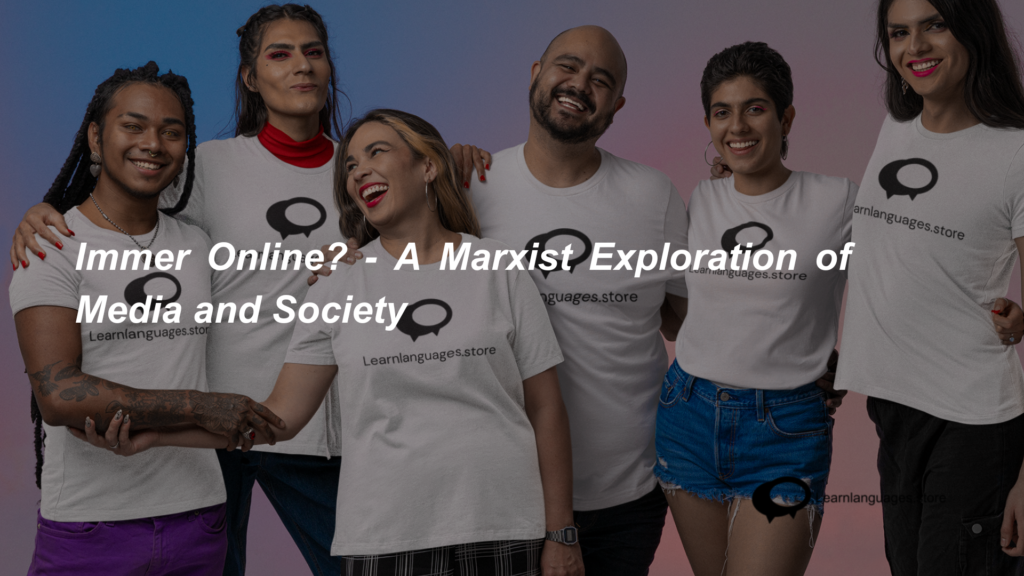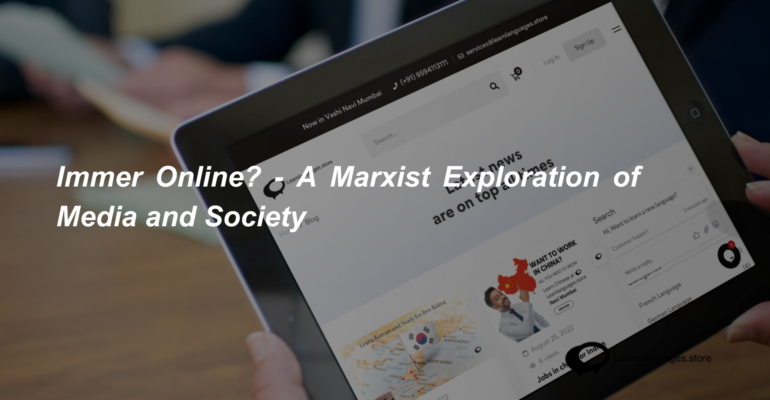Immer Online? – A Marxist Exploration of Media and Society
Immer Online? – A Marxist Exploration of Media and Society
Estimated reading time: 15 minutes
Greetings, comrades! Today, we delve into a topic that is increasingly relevant in our digital age—Immer online? (Always online?)—taken from the Netzwerk A2 book. As we navigate through this theme, we will discuss the pros and cons of being constantly connected, make comparisons, conduct interviews, understand and express opinions in texts, discuss movies, and learn how to write and understand film comments. All of this will be explored through a Marxist lens, reflecting on how media influences society and the individual.

1. Discussing the Pros and Cons of Being Always Online (Vor- und Nachteile besprechen)
In our capitalist society, being always online is often portrayed as a necessity—an endless chase for productivity and connectivity. However, from a Marxist perspective, we must critically evaluate the pros and cons of this constant digital presence. Is it truly liberating, or does it further enslave the proletariat to the demands of capitalist production and consumption?
Pros:
- Schnelle Kommunikation:
(Fast communication)
The internet allows us to communicate instantly with anyone around the world. This is a double-edged sword—while it enables global solidarity, it also facilitates the spread of capitalist propaganda. - Example:
Mit Freunden online zu chatten ist schnell und einfach.
(Chatting with friends online is quick and easy.)
ऑनलाइन दोस्तों से बात करना तेज और आसान है।
(online doston se baat karna tez aur aasan hai.) - Zugang zu Informationen:
(Access to information)
The internet provides unprecedented access to information, but we must remain vigilant about the sources of this information. Is it empowering the working class or perpetuating capitalist ideologies? - Example:
Im Internet findet man schnell viele Informationen.
(You can quickly find a lot of information on the internet.)
इंटरनेट पर आप जल्दी से कई जानकारी प्राप्त कर सकते हैं।
(internet par aap jaldi se kai jaankaari prapt kar sakte hain.)
Cons:
- Datenschutzprobleme:
(Privacy issues)
The internet often comes at the cost of our privacy. In a capitalist system, our data is a commodity, traded for profit without our consent. - Example:
Im Internet gibt es viele Datenschutzprobleme.
(There are many privacy issues on the internet.)
इंटरनेट पर कई गोपनीयता समस्याएं हैं।
(internet par kai gopniyata samasyaen hain.) - Abhängigkeit:
(Dependence)
The constant need to be online creates a dependency, where the working class becomes increasingly reliant on capitalist tools to maintain their daily lives. - Example:
Viele Menschen sind abhängig vom Internet.
(Many people are dependent on the internet.)
कई लोग इंटरनेट पर निर्भर हैं।
(kai log internet par nirbhar hain.)
Cultural Note:
In Germany, there is a growing awareness of the importance of digital detox, reflecting a desire to reclaim time and privacy from the relentless demands of the online world. This cultural shift mirrors a broader resistance to the commodification of every aspect of life, including our personal data and time.
2. Making Comparisons (Vergleiche anstellen)
Comparisons are essential for understanding the nuances of different aspects of life, especially when evaluating the impact of media on society. In a capitalist system, we are often encouraged to compare ourselves to others in ways that perpetuate inequality. However, from a Marxist perspective, comparisons should be used to highlight disparities and work towards equality.
Example Phrases:
- Das Internet ist schneller als traditionelle Medien.
(The internet is faster than traditional media.)
इंटरनेट पारंपरिक मीडिया से तेज है।
(internet paaranparik media se tez hai.) - Soziale Medien sind populärer als Zeitungen.
(Social media is more popular than newspapers.)
सोशल मीडिया अखबारों से अधिक लोकप्रिय है।
(social media akhbaron se adhik lokpriy hai.) - Ein Smartphone ist teurer als ein Buch.
(A smartphone is more expensive than a book.)
एक स्मार्टफोन एक किताब से महंगा है।
(ek smartphone ek kitaab se mehenga hai.) - Online-Nachrichten sind aktueller als Fernsehnachrichten.
(Online news is more current than TV news.)
ऑनलाइन समाचार टीवी समाचार से अधिक अद्यतन है।
(online samachar TV samachar se adhik adhyatan hai.) - Das Kinoerlebnis ist besser als das Ansehen von Filmen zu Hause.
(The cinema experience is better than watching movies at home.)
सिनेमा अनुभव घर पर फिल्में देखने से बेहतर है।
(cinema anubhav ghar par filmen dekhne se behtar hai.)
Cultural Note:
In the D-A-CH region (Germany, Austria, Switzerland), traditional media such as newspapers and radio still hold significant influence, even as digital media grows in prominence. This coexistence reflects the region’s commitment to preserving cultural heritage while adapting to technological advancements.
-
Product on sale
 German B1
German B1₹32,600.00
₹42,600.00 -
Product on sale
 German A2
German A2₹24,300.00
₹32,600.00
3. Conducting Interviews (Interviews durchführen)
Conducting interviews is a powerful tool for gathering diverse perspectives and insights, especially in understanding how media impacts different segments of society. From a Marxist standpoint, interviews can reveal the ways in which media shapes consciousness and perpetuates class structures.
Example Phrases:
- Was denken Sie über soziale Medien?
(What do you think about social media?)
आप सोशल मीडिया के बारे में क्या सोचते हैं?
(aap social media ke baare mein kya sochte hain?) - Wie oft nutzen Sie das Internet?
(How often do you use the internet?)
आप इंटरनेट का उपयोग कितनी बार करते हैं?
(aap internet ka upyog kitni baar karte hain?) - Welche Medien nutzen Sie am meisten?
(Which media do you use the most?)
आप सबसे ज्यादा किस मीडिया का उपयोग करते हैं?
(aap sabse zyada kis media ka upyog karte hain?) - Glauben Sie, dass das Internet mehr Vorteile oder Nachteile hat?
(Do you think the internet has more advantages or disadvantages?)
क्या आपको लगता है कि इंटरनेट के अधिक फायदे या नुकसान हैं?
(kya aapko lagta hai ki internet ke adhik faayde ya nuksan hain?) - Wie hat das Internet Ihr Leben verändert?
(How has the internet changed your life?)
इंटरनेट ने आपके जीवन को कैसे बदला है?
(internet ne aapke jeevan ko kaise badla hai?)
Cultural Note:
In German-speaking countries, the tradition of thorough and respectful interviews is well-regarded. This cultural aspect reflects a deep respect for individual opinions and a commitment to understanding different viewpoints, which is essential in any discourse on media and society.
4. Understanding and Expressing Opinions in Texts (Meinungen in Texten verstehen und ausdrücken)
Understanding and expressing opinions in written texts is a critical skill, particularly when discussing complex issues such as the influence of media. From a Marxist perspective, the ability to critically analyze and articulate one’s views is essential for challenging dominant ideologies and advocating for social change.
Example Phrases:
- Ich finde, dass soziale Medien nützlich sind.
(I think that social media is useful.)
मुझे लगता है कि सोशल मीडिया उपयोगी है।
(mujhe lagta hai ki social media upyogi hai.) - Meiner Meinung nach hat das Internet viele Nachteile.
(In my opinion, the internet has many disadvantages.)
मेरे विचार में, इंटरनेट के कई नुकसान हैं।
(mere vichar mein, internet ke kai nuksan hain.) - Es ist wichtig, auf Datenschutz im Internet zu achten.
(It is important to pay attention to data privacy on the internet.)
इंटरनेट पर गोपनीयता पर ध्यान देना महत्वपूर्ण है।
(internet par gopniyata par dhyan dena mahatvapurn hai.) - Ich bin der Meinung, dass man das Internet bewusst nutzen sollte.
(I believe that one should use the internet consciously.)
मेरा मानना है कि इंटरनेट का उपयोग सोच-समझकर करना चाहिए।
(mera maana hai ki internet ka upyog soch-samajhkar karna chahiye.) - Es gibt viele positive und negative Aspekte von sozialen Medien.
(There are many positive and negative aspects of social media.)
सोशल मीडिया के कई सकारात्मक और नकारात्मक पहलू हैं।
(social media ke kai sakaratmak aur nakaratmak pehlu hain.)
Cultural Note:
In German-speaking countries, expressing one’s opinion is often done in a considered and well-structured manner. This reflects the cultural value placed on reasoned debate and the importance of understanding all sides of an issue before forming a conclusion.
5. Discussing Movies (Filme besprechen)
Movies are not just entertainment—they are a reflection of society, culture, and the underlying economic systems that shape them. In discussing films, we can explore how cinema both reflects
and critiques the capitalist system, offering a space for revolutionary ideas to be disseminated.
Example Phrases:
- Der Film war spannend und gut gemacht.
(The movie was exciting and well-made.)
फिल्म रोमांचक और अच्छी तरह से बनाई गई थी।
(film romanchak aur achhi tarah se banai gayi thi.) - Die Schauspieler haben großartig gespielt.
(The actors performed excellently.)
अभिनेताओं ने शानदार अभिनय किया।
(abhinetaon ne shandar abhinay kiya.) - Der Film hat eine wichtige Botschaft.
(The film has an important message.)
फिल्म में एक महत्वपूर्ण संदेश है।
(film mein ek mahatvapurn sandesh hai.) - Die Handlung war manchmal verwirrend.
(The plot was confusing at times.)
कथानक कभी-कभी भ्रमित करने वाला था।
(kathanak kabhi-kabhi bhramit karne wala tha.) - Ich würde den Film empfehlen.
(I would recommend the movie.)
मैं इस फिल्म की सिफारिश करूंगा।
(main is film ki sifarish karunga.)
Cultural Note:
The D-A-CH region is home to some iconic film locations and a rich tradition of cinema. From the majestic landscapes seen in films shot in Switzerland to the historical sites in Germany and Austria, the region’s contributions to global cinema are significant. Understanding the cultural context of these films adds depth to our appreciation and critique of them.
6. Writing and Understanding Film Comments (Filmkommentare schreiben und verstehen)
Writing and understanding film comments is an exercise in both language and critical thinking. Film comments allow us to express our thoughts on a movie’s content, themes, and execution, and they can serve as a platform for discussing broader social and political issues.
Example Phrases:
- Dieser Film hat mich sehr beeindruckt.
(This film impressed me greatly.)
इस फिल्म ने मुझ पर गहरा प्रभाव डाला।
(is film ne mujh par gahra prabhav daala.) - Der Regisseur hat eine interessante Perspektive gewählt.
(The director chose an interesting perspective.)
निर्देशक ने एक दिलचस्प दृष्टिकोण चुना।
(nirdeshak ne ek dilchasp drishtikon chuna.) - Die Musik in dem Film war sehr passend.
(The music in the film was very fitting.)
फिल्म में संगीत बहुत उपयुक्त था।
(film mein sangeet bahut upyukt tha.) - Ich fand das Ende des Films überraschend.
(I found the film’s ending surprising.)
मुझे फिल्म का अंत आश्चर्यजनक लगा।
(mujhe film ka ant aashcharyajanak laga.) - Der Film hat eine wichtige soziale Frage angesprochen.
(The film addressed an important social issue.)
फिल्म ने एक महत्वपूर्ण सामाजिक मुद्दे पर प्रकाश डाला।
(film ne ek mahatvapurn samajik mudde par prakaash daala.)
Cultural Note:
In German-speaking countries, film critique is a respected art form, with a rich tradition of analyzing not just the technical aspects of a film but also its social and political implications. This reflects a broader cultural appreciation for cinema as a medium of both entertainment and intellectual engagement.
Vocabulary List
1. Medien (Media)
- das Internet (internet)
Ich surfe jeden Tag im Internet.
(I surf the internet every day.)
मैं हर दिन इंटरनेट पर सर्फ करता हूँ।
(main har din internet par surf karta hoon.) - die Zeitung (newspaper)
Ich lese die Zeitung am Morgen.
(I read the newspaper in the morning.)
मैं सुबह अखबार पढ़ता हूँ।
(main subah akhbar padhta hoon.) - der Fernseher (television)
Wir schauen abends oft Fernsehen.
(We often watch TV in the evening.)
हम शाम को अक्सर टीवी देखते हैं।
(hum shaam ko aksar TV dekhte hain.) - das Radio (radio)
Ich höre Musik im Radio.
(I listen to music on the radio.)
मैं रेडियो पर संगीत सुनता हूँ।
(main radio par sangeet sunta hoon.) - das Buch (book)
Ich lese gern Bücher.
(I like reading books.)
मुझे किताबें पढ़ना पसंद है।
(mujhe kitaabein padhna pasand hai.) - das Magazin (magazine)
Sie liest ein Magazin über Mode.
(She is reading a magazine about fashion.)
वह फैशन के बारे में एक पत्रिका पढ़ रही है।
(vah fashion ke baare mein ek patrika padh rahi hai.) - die Webseite (website)
Diese Webseite bietet viele Informationen.
(This website offers a lot of information.)
यह वेबसाइट बहुत सारी जानकारी प्रदान करती है।
(yah website bahut saari jaankaari pradan karti hai.) - der Blog (blog)
Er schreibt einen Blog über Technik.
(He writes a blog about technology.)
वह तकनीक के बारे में एक ब्लॉग लिखता है।
(vah takneek ke baare mein ek blog likhta hai.) - der Podcast (podcast)
Ich höre gerne Podcasts auf dem Weg zur Arbeit.
(I like listening to podcasts on the way to work.)
मुझे काम पर जाते समय पॉडकास्ट सुनना पसंद है।
(mujhe kaam par jaate samay podcast sunna pasand hai.) - die Social Media (social media)
Soziale Medien sind heutzutage sehr beliebt.
(Social media is very popular nowadays.)
आजकल सोशल मीडिया बहुत लोकप्रिय है।
(aajkal social media bahut lokpriy hai.)
2. Aktivitäten mit Medien (Activities with Media)
- chatten (to chat)
Wir chatten jeden Abend online.
(We chat online every evening.)
हम हर शाम ऑनलाइन बात करते हैं।
(hum har shaam online baat karte hain.) - surfen (to surf)
Ich surfe oft im Internet.
(I often surf the internet.)
मैं अक्सर इंटरनेट पर सर्फ करता हूँ।
(main aksar internet par surf karta hoon.) - lesen (to read)
Sie liest jeden Tag die Nachrichten.
(She reads the news every day.)
वह हर दिन समाचार पढ़ती है।
(vah har din samachar padhti hai.) - schreiben (to write)
Er schreibt einen Artikel für die Zeitung.
(He writes an article for the newspaper.)
वह अखबार के लिए एक लेख लिखता है।
(vah akhbar ke liye ek lekh likhta hai.) - posten (to post)
Sie postet regelmäßig Fotos auf Social Media.
(She regularly posts photos on social media.)
वह सोशल मीडिया पर नियमित रूप से फोटो पोस्ट करती है।
(vah social media par niyamit roop se photo post karti hai.) - filmen (to film)
Wir filmen ein Video für unser Projekt.
(We are filming a video for our project.)
हम अपने प्रोजेक्ट के लिए एक वीडियो बना रहे हैं।
(hum apne project ke liye ek video bana rahe hain.) - hören (to listen)
Ich höre gerne Musik beim Arbeiten.
(I like listening to music while working.)
मुझे काम करते समय संगीत सुनना पसंद है।
(mujhe kaam karte samay sangeet sunna pasand hai.) - spielen (to play)
Er spielt oft Videospiele online.
(He often plays video games online.)
वह अक्सर ऑनलाइन वीडियो गेम खेलता है।
(vah aksar online video game khelta hai.) - streamen (to stream)
Wir streamen die neue Serie auf Netflix.
(We are streaming the new series on Netflix.)
हम नेटफ्लिक्स पर नई सीरीज स्ट्रीम कर रहे हैं।
(hum Netflix par nai series stream kar rahe hain.) - teilen (to share)
Sie teilt ihre Meinung in den Kommentaren.
(She shares her opinion in the comments.)
वह अपनी राय टिप्पणियों में साझा करती है।
(vah apni rai tippaniyon mein saanjha karti hai.)
3. Film (Film)
- der Schauspieler (actor)
Der Schauspieler hat seine Rolle gut gespielt.
(The actor played his role well.)
अभिनेता ने अपनी भूमिका अच्छी तरह निभाई।
(abhineta ne apni bhoomika achhi tarah nibhayi.) - die Schauspielerin (actress)
Die Schauspielerin ist sehr talentiert.
(The actress is very talented.)
अभिनेत्री बहुत प्रतिभाशाली है।
(abhinetri bahut pratibhashali hai.) - das Drehbuch (script)
Das Drehbuch des Films war hervorragend.
(The film’s script was excellent.)
फिल्म की पटकथा शानदार थी।
(film ki patkatha shandar thi.) - die Szene (scene)
Die Szene im Restaurant war sehr lustig.
(The scene in the restaurant was very funny.)
रेस्टोरेंट का दृश्य बहुत मजेदार था।
(restaurant ka drishya bahut mazedar tha.) - der Regisseur (director)
Der Regisseur hat eine interessante Perspektive gewählt.
(The director chose an interesting perspective.)
निर्देशक ने एक दिलचस्प दृष्टिकोण चुना।
(nirdeshak ne ek dilchasp drishtikon chuna.) - die Kamera (camera)
Die Kameraarbeit in diesem Film war beeindruckend.
(The camera work in this film was impressive.)
इस फिल्म में कैमरा का काम प्रभावशाली था।
(is film mein camera ka kaam prabhavshaali tha.) - die Musik (music)
Die Musik im Film hat die Stimmung gut unterstützt.
(The music in the film supported the mood well.)
फिल्म में संगीत ने माहौल को अच्छी तरह से समर्थन दिया।
(film mein sangeet ne maahaul ko achhi tarah se samarthan diya.) - das Genre (genre)
Horror ist mein Lieblingsgenre.
(Horror is my favorite genre.)
हॉरर मेरा पसंदीदा जॉनर है।
(horror mera pasandeeda genre hai.) - die Kritik (review)
Die Kritiken zu diesem Film waren überwiegend positiv.
(The reviews for this film were mostly positive.)
इस फिल्म की समीक्षाएं ज्यादातर सकारात्मक थीं।
(is film ki sameekshaan jyadatar sakaratmak thi.) - das Ende (ending)
Das Ende des Films war unerwartet.
(The film’s ending was unexpected.)
फिल्म का अंत अप्रत्याशित था।
(film ka ant apratyashit tha.)
Enhance Your German Skills!
To improve your German further, consider enrolling in our A1 Level German Course at Learn Languages Store for just Rs. 16,300. Our courses are designed to help you build a strong foundation in the German language in a fun and engaging way.
Contact Us to Learn More!
For more information about our courses, feel free to reach out to us at:
Address:
330, 3rd Floor, Big Splash (Near Vashi Bus Depot),
Sector 17, Vashi,
Navi Mumbai, Maharashtra 400703
Phone: +91-9594113111
Email: services@learnlanguages.store
Don’t miss the opportunity to enhance your language skills! Sign up today and start your journey to fluency in German!
Conclusion
In our exploration of Immer Online? from the Netzwerk A2 book, we have covered the complex relationship between media and society, discussing the pros and cons of being constantly connected, making comparisons, conducting interviews, understanding and expressing opinions in texts, discussing movies, and writing film comments. Each of these elements has been approached with a critical Marxist lens, urging us to question how media both reflects and shapes the socio-economic structures we live within.
As we navigate the digital age, it’s crucial to remain aware of the influences that media holds over our lives. From social media to film, every piece of content we consume is a reflection of the society it originates from, often perpetuating capitalist ideologies. Yet, it also offers opportunities for resistance, solidarity, and the spread of revolutionary ideas.
Remember, comrades, the power to shape society lies not just in our hands but in our minds as well. By critically engaging with the media we consume, we can push for a world that aligns more closely with the ideals of equality, fairness, and collective progress. As Marx once said, “The production of ideas, of conceptions, of consciousness, is at first directly interwoven with the material activity and the material intercourse of men, the language of real life.” So, let us use language and media not just as tools of consumption but as instruments of change.










